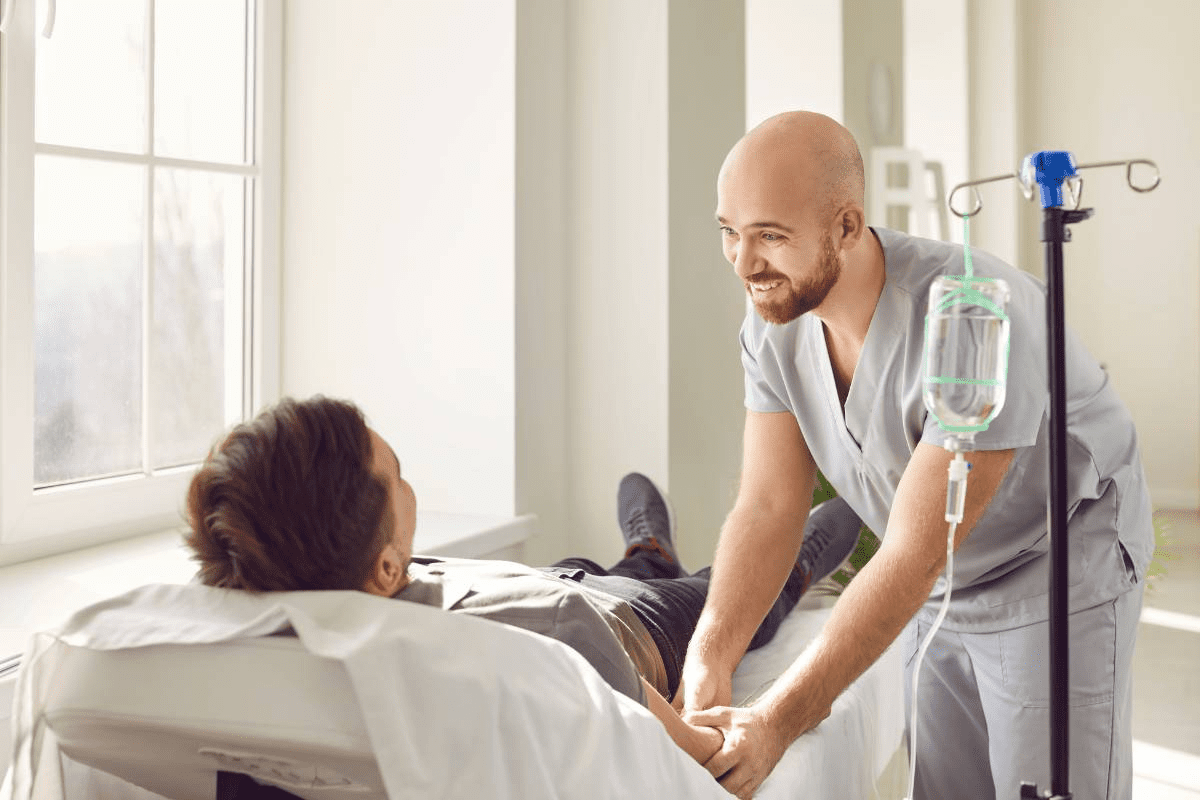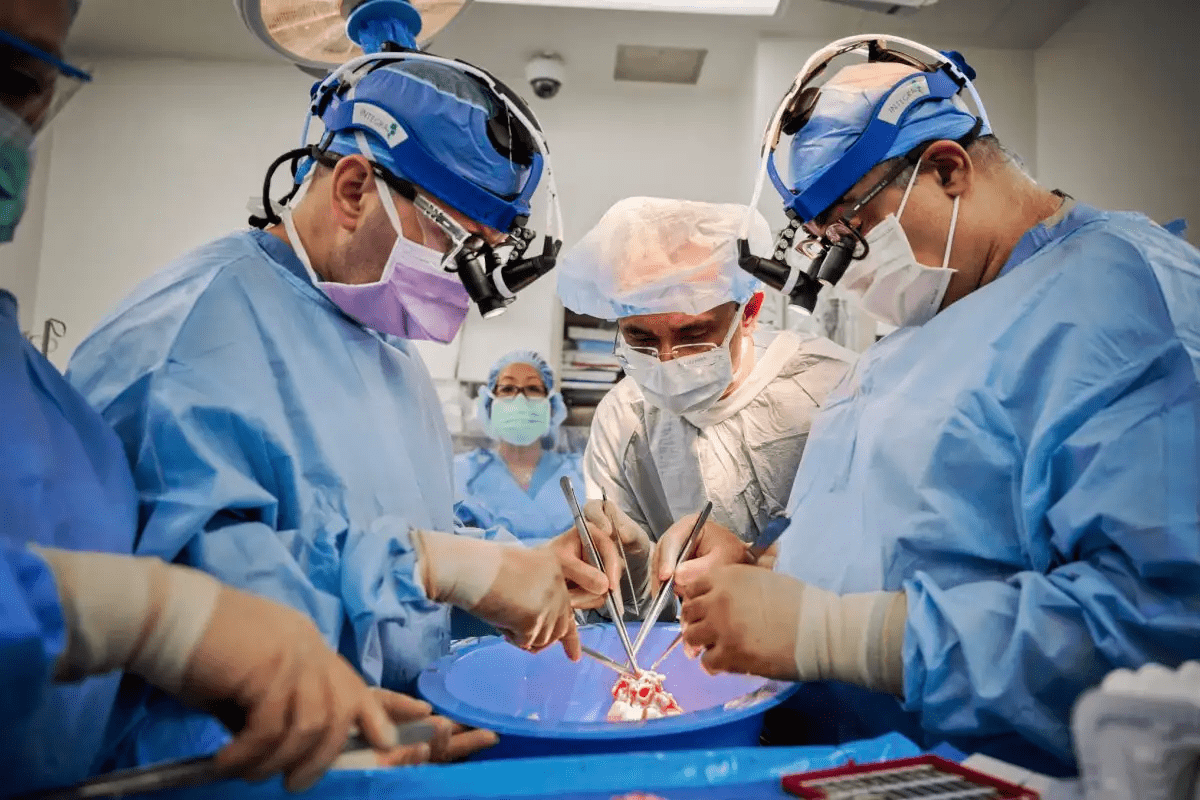Last Updated on November 27, 2025 by Bilal Hasdemir
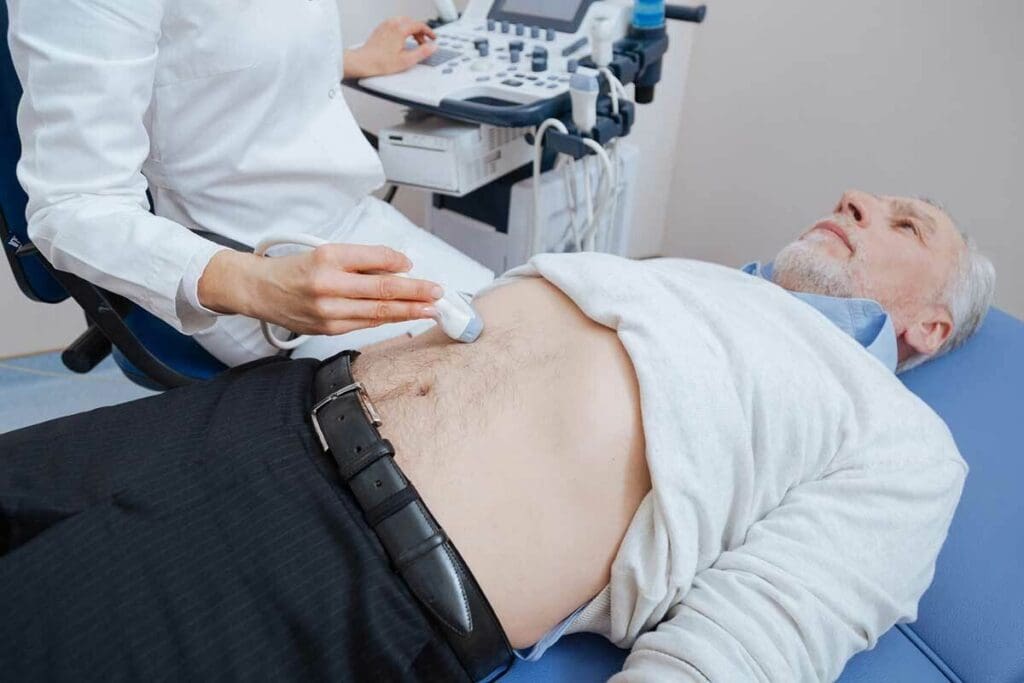
Before a CT scan of the abdomen, you need to know can you eat before a CT scan and what to drink. The kind of scan and whether contrast material is used affect your prep.
A CT scan of the abdomen can reveal the organs, blood vessels, and bones in your belly. To get the best results and feel comfortable, you need to prepare correctly.
We’ll help you get ready for the scan. This includes tips on fasting for a CT scan and what to expect during it.
Key Takeaways
- Understand the type of CT scan and its requirements.
- Follow specific dietary instructions before the scan.
- Know whether contrast material will be used.
- Be prepared for the exam to ensure comfort and accuracy.
- Follow the guidance provided by your healthcare provider.
Understanding Abdominal CT Scans
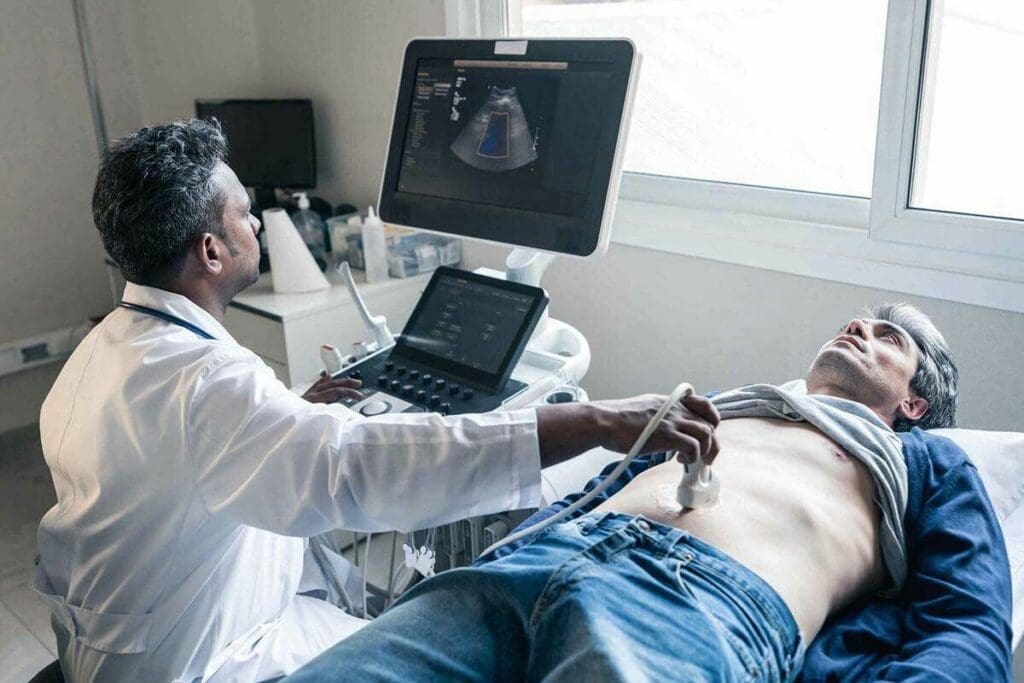
Before getting a CT scan of the abdomen, it’s good to know the basics. A CT scan is a test that makes detailed pictures of the inside of organs and tissues. It’s great for finding problems in the belly area.
What is a CT Scan of the Abdomen?
A CT scan of the abdomen is a special X-ray of the belly. It looks at organs like the liver and intestines. Doctors use it to find injuries, cancers, infections, and more. You lie on a table that moves into a big machine. The machine takes pictures from all sides.
Why Proper Preparation Affects Scan Quality
Getting ready right is key to a good CT scan. You might need to fast or drink a special liquid. It’s important to follow these steps because they affect the scan’s quality. If you don’t prepare well, the scan might not work right, and you might have to do it again.
How Long Does the Procedure Take
CT scans don’t take long. They usually last 15 to 30 minutes. But, you’ll spend more time at the hospital because of getting ready and waiting. The actual scan time is short, making it a fast way to get answers.
Types of Abdominal CT Scans and Their Requirements
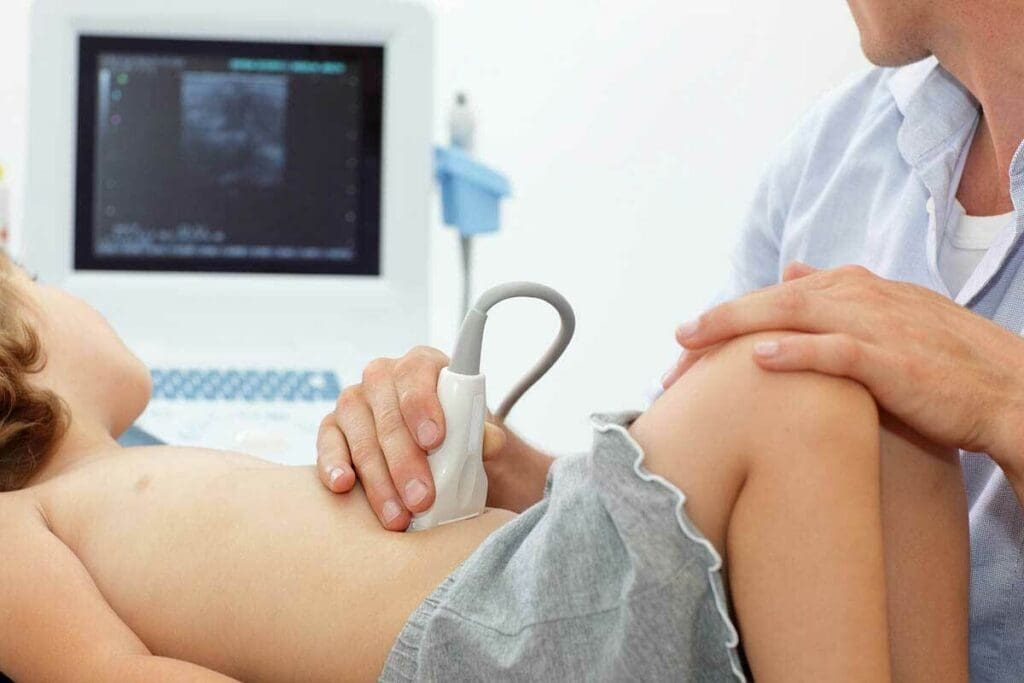
It’s important to know the difference between CT scans with and without contrast. When you’re getting ready for a CT scan of your abdomen, you need to understand that there are two main types. These are scans with contrast and those without.
CT Scans With Contrast
CT scans with contrast use a special dye that’s injected or swallowed. This dye makes certain body parts stand out, helping doctors find problems. It’s really helpful for looking at blood vessels, tumors, or inflammation. The dye has iodine, which is safe for most people. But you must tell your doctor if you’re allergic to contrast materials.
CT Scans Without Contrast
CT scans without contrast don’t use any dye. They’re good for finding things like kidney stones, internal injuries, or some tumors. They’re quicker and simpler than scans with contrast. But, they might not show as much detail, like in soft tissues.
When Each Type is Recommended
Choosing between a CT scan with or without contrast depends on what you’re being checked for. For tumors or blood vessels, contrast is usually best. For kidney stones or internal injuries, a non-contrast scan might be done
- CT scans with contrast are typically recommended for diagnosing conditions that involve blood vessels, tumors, or inflammatory processes.
- CT scans without contrast are often used for detecting kidney stones, internal injuries, or certain types of tumors.
Your healthcare provider will decide which scan is right for you based on your health needs.
Can You Eat Before a CT Scan? General Fasting Guidelines
Many patients wonder if they can eat before a CT scan. The answer varies based on the scan type and your doctor’s instructions.
For most abdominal CT scans, fasting for 2 to 4 hours is required. This ensures clear images for diagnosis.
Standard 2-4 Hour Fasting Protocol
For abdominal CT scans, fasting for 2 to 4 hours is standard. This reduces food in the digestive system, improving image quality.
- Clear Liquids: Clear liquids are usually okay up to a certain point before the scan.
- Avoid Heavy Meals: Heavy or fatty foods should be avoided for longer before the scan.
Why Food Restriction Improves Imaging
Food in the abdomen can make image interpretation harder. It might be mistaken for abnormalities or hide organ details.
Benefits of Fasting:
- Fasting reduces image artifacts from food movement.
- It makes images clearer.
- It ensures accurate diagnosis by avoiding food interference.
Exceptions to Standard Fasting Rules
While 2-4 hour fasting is common, exceptions exist. These depend on your health and the scan’s needs.
Special Considerations:
- Patients with certain conditions may need different fasting times.
- The contrast material used can affect fasting rules.
- Some patients may need a specific diet or hydration plan before the scan.
Always follow your healthcare provider’s or radiology department’s specific instructions. They will tailor guidance to your health and scan requirements.
By following fasting guidelines, you help ensure a successful CT scan. This leads to high-quality images for accurate diagnosis and treatment planning.
Preparation for CT Scans Without Contrast
Knowing what to do before a CT scan without contrast is key. This prep helps make sure the scan works well. It’s all about getting clear images.
Food and Drink Restrictions
For CT scans without contrast, eating and drinking rules are not as strict. But it’s important to follow them. Patients should eat a light meal or snack a few hours before. Avoiding heavy or fatty meals is also a good idea.
Stay away from foods and drinks that can cause gas or discomfort. This includes carbonated drinks, beans, and cabbage. They might mess up the image quality.
Water Consumption Guidelines
Drinking water is a must, and it’s encouraged before a CT scan without contrast. It keeps you comfortable and helps get clearer images. But always listen to your healthcare provider’s hydration advice.
| Recommended Fluid | Quantity | Timing |
| Water | 1-2 glasses | 1-2 hours before the scan |
| Clear broth | 1 cup | 1 hour before the scan |
Medication Considerations
Tell your healthcare provider about any medicines you’re taking. Some medicines might need to be changed or stopped before the scan. This depends on the medicine and your health.
“It’s important to tell your healthcare provider about your medicines to avoid problems during the CT scan.”
By following these tips, you’ll be ready for your CT scan without contrast. This makes the experience smoother and less stressful.
Preparation for CT Scans With Oral Contrast
Oral contrast is key for better abdominal CT scans. It’s a liquid with barium or iodine that makes the digestive tract stand out. This makes the images clearer.
What is Oral Contrast and How Does it Work
Before a CT scan, you drink oral contrast. It coats the digestive tract. This makes it easier to see the tract and other parts of the abdomen.
Knowing why you drink oral contrast is important. It helps doctors get better images. This leads to more accurate diagnoses.
Timing: When to Drink Contrast Solution
When to drink the contrast solution is important. It depends on the CT scan’s needs. You might need to drink it 30 minutes to a few hours before.
To get the best results, do this:
- Drink the contrast as told.
- Don’t eat or drink anything else during that time.
- Tell your doctor if you have any problems with the contrast.
Types of Contrast Materials and Their Taste
There are different contrast materials. Some are barium-based, others iodine-based. Their taste and texture can differ. Barium solutions are thicker and chalkier, while iodine ones are more liquid but taste stronger.
Drinking contrast can be hard for some. So, ask your doctor about the type you’ll get. They might have tips to make it easier.
Preparation for CT Scans With IV Contrast
To get ready for a CT scan with IV contrast, knowing its role and what you need to do is key. IV contrast makes blood vessels, organs, and other body parts show up better on the scan. “The use of IV contrast significantly improves the diagnostic accuracy of CT scans by highlighting areas of interest,” says a medical expert, a radiologist with over a decade of experience.
IV contrast has iodine in it. This iodine absorbs X-rays, making it visible on CT images. This clear view helps doctors spot many health issues more accurately.
Pre-Scan Hydration Requirements
Drinking lots of water before a CT scan with IV contrast is very important. It helps your body handle the contrast material better. Drinking enough water also lowers the chance of kidney problems from the contrast.
Make sure to drink clear liquids as your doctor tells you to. This keeps you hydrated before the scan.
Special Considerations for Kidney Health
People with kidney issues need extra care before a CT scan with IV contrast. We check how well your kidneys work before giving you the contrast. “For patients with compromised kidney function, alternative imaging methods or special preparation protocols may be necessary,” notes a medical expert, a nephrologist.
In some cases, we might suggest special hydration plans or medicines to protect your kidneys. Always tell your doctor about any kidney problems or concerns before the scan.
What to Drink Before a CT Scan of the Abdomen
When you’re getting ready for an abdominal CT scan, it’s important to think about your fluids. Drinking enough water is key, and even more so if you’ll be getting contrast material during the scan.
Clear Liquids That Are Permitted
Most doctors tell patients to drink clear liquids before a CT scan. These include:
- Water
- Clear broth
- Plain gelatin
- Black coffee or tea (without milk or cream)
- Clear juice such as apple or grape juice
These drinks help keep you hydrated without messing with the scan. For more info on getting ready for a CT scan,
Beverages to Strictly Avoid
Some drinks can mess with the CT scan or the contrast material. So, it’s best to avoid them. These include:
- Milk and dairy products
- Any beverages containing cream
- Sugary drinks may cause stomach discomfort
- Alcoholic beverages
Staying away from these drinks will help your stomach be ready for the scan.
Hydration Timeline Before Your Appointment
Drinking enough water is very important, even more so if you’re getting contrast material. Here’s a simple plan to follow:
| Time Before Scan | Hydration Recommendation |
| 2 hours before | Drink 1-2 glasses of water or other clear liquids |
| 1 hour before | Keep drinking clear liquids; avoid heavy or caffeinated drinks |
| 30 minutes before | Finish any remaining clear liquids; get ready for your scan |
Stick to this plan to make sure you’re hydrated and ready for your CT scan. If you have any questions or worries about what to drink, talk to your doctor.
Special Dietary Considerations for Specific Patients
Patients with certain health conditions need special diets before an abdominal CT scan. We know that those with specific medical conditions must follow certain dietary guidelines. This is to ensure the scan’s accuracy and their safety.
For diabetic patients, managing blood sugar levels before a CT scan is key. It’s wise to talk to your doctor about adjusting your medication or insulin on the scan day. Diabetic patients should also follow the standard fasting guidelines for the CT scan.
Patients with kidney disease must be careful with their hydration. They may need to adjust their fluid intake before the scan. It’s important to tell your healthcare provider about your kidney disease for personalized advice.
Patients with allergies and those allergic to contrast materials should tell their healthcare provider before the scan. We can then discuss alternative options or pre-medication to reduce the risk of an allergic reaction.
For pregnant women, discussing the risks and benefits of a CT scan with their healthcare provider is essential. While the benefits of a CT scan often outweigh the risks, we take every precaution to ensure the patient’s and the fetus’s safety.
| Patient Group | Dietary Consideration | Action Required |
| Diabetic Patients | Manage blood sugar levels | Consult da doctor about medication adjustment |
| Patients with Kidney Disease | Adjust hydration levels | Inform the healthcare provider about the kidney disease |
| Patients with Allergies | Avoid allergic reactions to contrast | Discuss alternative options or pre-medication with a healthcare provider |
| Pregnant Women | Assess risks and benefits of a CT scan | Discuss with a healthcare provider |
By understanding and addressing these special dietary considerations, we can ensure that all patients are properly prepared for their CT scan. This enhances both the safety and the effectiveness of the procedure.
Common Preparation Mistakes to Avoid
Getting ready for a CT scan of the abdomen needs careful attention. This helps avoid common mistakes. When patients are well-prepared, the scan is more likely to be successful. This reduces the need for repeat scans and saves time.
Preparing for a CT scan can seem overwhelming. But knowing the most common mistakes can help a lot. This knowledge can improve your scan’s outcome.
Misunderstanding Fasting Instructions
One big mistake is not understanding fasting instructions. Fasting rules change based on the CT scan type. Some scans need you to fast for 2-4 hours, while others might need longer. Always follow your healthcare provider’s fasting instructions to avoid delays.
- Check with your healthcare provider for specific fasting instructions.
- Know what you can and can’t eat during fasting.
- Plan your meals to avoid last-minute changes.
Improper Contrast Consumption
Another mistake is not following the instructions for contrast material. Contrast material makes CT scan images clearer. It’s important to use it as directed, whether it’s oral or intravenous.
If you need to drink oral contrast, remember to:
- Drink it at the right time.
- Finish the whole amount given.
- Tell your healthcare provider if you have any bad reactions.
Forgetting to Remove Metal Objects
Forgetting to remove metal objects is another mistake. Metal can mess up CT scan images, causing problems or needing a repeat. Before your scan, take off any metal items, like:
- Jewelry
- Clothing with metal parts (e.g., zippers, buckles)
- Dental appliances (if told to remove them)
Knowing these common mistakes helps you avoid them. This ensures a smooth and successful CT scan experience.
What to Expect During and After Your Abdominal CT Scan
Getting ready for your abdominal CT scan? Knowing what to expect during and after can help ease your worries. We’re here to walk you through each step, making sure you’re informed and comfortable.
The Scanning Process
The CT scan of your abdomen is quick, usually taking 10 to 30 minutes. You’ll lie on a table that slides into a big, doughnut-shaped machine. Our team will help you get into the right spot and tell you how to stay calm and hold your breath when needed.
During the scan, you might hear sounds like clicking or whirring. This is normal and means the scan is working. If you get contrast material, you might feel a pinch from the IV and a warm feeling or taste during the injection.
Post-Scan Dietary Guidelines
After your scan, you can usually go back to eating normally unless your doctor says not to. If you have contrast material, drinking lots of water is key to getting it out of your system. Try to drink more water for the rest of the day.
Most people don’t need to follow special diets after a CT scan. But, if you’re unsure or have questions, always talk to your doctor for advice tailored to you.
Managing Possible Side Effects
CT scans are usually safe, but some might feel side effects from the contrast, like nausea or itching. These are usually mild and short-lived. If you have kidney disease, your doctor might check your kidneys after the scan.
If you have severe symptoms like trouble breathing or a bad rash, get help right away. For any other worries or questions, reach out to your healthcare provider.
Conclusion
Getting ready for an abdominal CT scan is very important. Knowing what to do can make the experience easier and the images clearer. We’ve covered the main steps to prepare, like what to eat, what contrast materials to use, and how much water to drink.
Remember, it’s vital to listen to your doctor’s advice, whether you need contrast or not. Following their fasting rules, using the right contrast, and drinking enough water are all key. These steps help make the scan a success.
Being well-prepared helps your doctors get the images they need to diagnose you correctly. If you have any doubts or questions, always ask your doctor. Working together, you and your medical team can make sure your CT scan goes smoothly.
FAQ
Do I need to fast for a CT scan of the abdomen?
The fasting time for a CT scan of the abdomen varies. It depends on the scan type and if contrast is used. Usually, you need to fast for 2-4 hours. Always follow your healthcare provider’s specific instructions.
Can I drink water before a CT scan with contrast?
Yes, you can usually drink water before a CT scan with contrast. But make sure to follow your healthcare provider’s hydration guidelines. This is important, more so if you’re getting IV contrast.
What is oral contrast, and how do I prepare for it?
Oral contrast is a liquid you drink before the scan to highlight your digestive tract. You’ll drink it at a specific time before the scan. Your healthcare provider will tell you exactly when and how to do it.
Are there any specific dietary considerations for diabetic patients undergoing a CT scan?
Yes, diabetic patients need to adjust their diet and medication before a CT scan, if contrast is used. It’s important to talk to your healthcare provider about managing your diabetes during this time.
Can I eat and drink normally after a CT scan?
Usually, you can eat and drink as you normally do after a CT scan. But if you had contrast, your healthcare provider might give you special dietary advice to help your body process it.
How long does a CT scan of the abdomen typically take?
The actual scan takes a few minutes. But getting ready and recovering can take about 30 minutes to an hour.
What are the common preparation mistakes to avoid before a CT scan?
Mistakes include not following fasting instructions, not drinking contrast correctly, and forgetting to remove metal objects. Knowing these mistakes can help make your scan go smoothly.
Are there any special considerations for patients with kidney disease?
Yes, patients with kidney disease need special care with CT scans and IV contrast. Your healthcare provider will check your kidney function and guide you on how to stay safe.
Can I take my medications as usual before a CT scan?
In most cases, you can keep taking your medications as usual. But it’s important to tell your healthcare provider about any medications, even if you’re getting a CT scan with contrast.
What should I do if I have an allergy to contrast material?
If you’re allergic to contrast material, tell your healthcare provider before the scan. They’ll help manage your allergy and might suggest alternative materials or pre-medication to avoid reactions.
References
- RadiologyInfo.org. (2024, March 31). Abdominal and pelvic CT. https://www.radiologyinfo.org/en/info/abdominct


